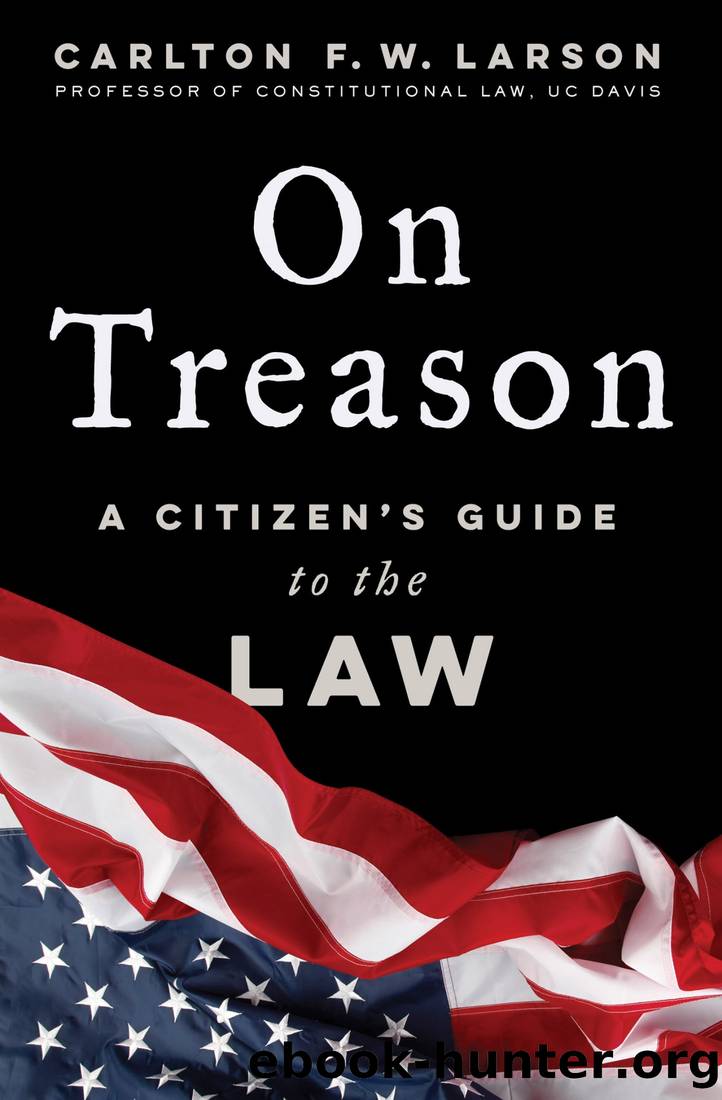On Treason by Carlton F. W. Larson

Author:Carlton F. W. Larson [Larson, Carlton F. W.]
Language: eng
Format: epub
Publisher: Ecco
Published: 2020-07-20T00:00:00+00:00
11
Tokyo Rose and the World War II Radio Broadcasters
In 1920, the first commercial radio station opened in Pittsburgh, Pennsylvania.1 Over the next twenty years, the radio business boomed, bringing the world together across previously unimaginable distances. Like all new technologies, it was quickly adapted for military purposes.2 Governments realized that radio could be used not only for troop communications but also for safely broadcasting propaganda directly into the heart of enemy territory. Radio broadcasts to wide audiences, which were nonexistent during World War I, took on enormous significance in World War II. The government of Nazi Germany, for example, viewed radio propaganda as a vital part of its war effort. As one Nazi propagandist later testified, German broadcasts aimed at American listeners were intended âto build up racial controversies, to create unrest regarding the economic inequalities in the country. . . . [to drive] a wedge between the people and the Roosevelt Administration, and [possibily get] a government elected in the United States which would be against interference in European affairs.â3
Effective propaganda, of course, required fluency in the listenerâs own language, so native speakers were essential. In the Pacific Ocean, American service members listened to broadcasts from Radio Tokyo, where English-speaking broadcasters presented programs of popular music and occasional Japanese propaganda. The Americans called the female broadcasters âTokyo Rose.â In Europe, âAxis Sallyâ (in reality an American citizen named Mildred Gillars) broadcast propaganda from Nazi Germany. So did the American journalists Douglas Chandler and Robert H. Best. And in Italy, the American poet Ezra Pound conducted propaganda broadcasts on behalf of Mussoliniâs fascist government.
All of these Americans would eventually be charged with treason for their broadcasting activities. These cases brought a modern twist to the old charge of aiding the enemy. The defendants did not provide military supplies or financial assistance. Instead, they were charged with sitting in a small room, projecting their voices over invisible radio waves in the direction of American troops.
The most legendary of these broadcasters was âTokyo Rose.â Popular accounts insisted that a Japanese-American woman named Iva Toguri DâAquino was the one and only âTokyo Rose.â In 1949 Toguri was tried and convicted of treason against the United States, and for many Americans her guilt seemed firmly established. Even today, the name âTokyo Roseâ is almost synonymous with traitor. But Toguriâs journey from obscurity to infamy reveals a far more complicated story, one of a young woman who may not have betrayed her country at all.
Nothing about Iva Toguriâs childhood in Southern California suggested that she would someday find herself charged with treason against the United States. She was born in Los Angeles on the Fourth of July, 1916, to parents who had emigrated from Japan. Although her parents were barred from American citizenship by the race-based restrictions then in force, Toguri was an American citizen by birth. In many ways, her childhood was thoroughly assimilated into the American mainstreamâEnglish was the primary language in her home, the family attended a Methodist church, she played tennis and was a member of the Girl Scouts, and most of her acquaintances were white.
Download
This site does not store any files on its server. We only index and link to content provided by other sites. Please contact the content providers to delete copyright contents if any and email us, we'll remove relevant links or contents immediately.
| Africa | Americas |
| Arctic & Antarctica | Asia |
| Australia & Oceania | Europe |
| Middle East | Russia |
| United States | World |
| Ancient Civilizations | Military |
| Historical Study & Educational Resources |
Magic and Divination in Early Islam by Emilie Savage-Smith;(1530)
Papillon by Henry Charrière(1417)
Bohemians, Bootleggers, Flappers, and Swells: The Best of Early Vanity Fair by Bohemians Bootleggers Flappers & Swells- The Best of Early Vanity Fair (epub)(1394)
Ambition and Desire: The Dangerous Life of Josephine Bonaparte by Kate Williams(1380)
Twelve Caesars by Mary Beard(1310)
Operation Vengeance: The Astonishing Aerial Ambush That Changed World War II by Dan Hampton(1155)
What Really Happened: The Death of Hitler by Robert J. Hutchinson(1154)
London in the Twentieth Century by Jerry White(1141)
The Japanese by Christopher Harding(1129)
Time of the Magicians by Wolfram Eilenberger(1121)
Twilight of the Gods by Ian W. Toll(1110)
Lenin: A Biography by Robert Service(1071)
The Devil You Know by Charles M. Blow(1018)
A Social History of the Media by Peter Burke & Peter Burke(966)
Freemasons for Dummies by Hodapp Christopher;(960)
Napolean Hill Collection by Napoleon Hill(936)
Henry III by David Carpenter;(919)
The Churchill Complex by Ian Buruma(906)
The Rise and Triumph of the Modern Self by Unknown(904)
